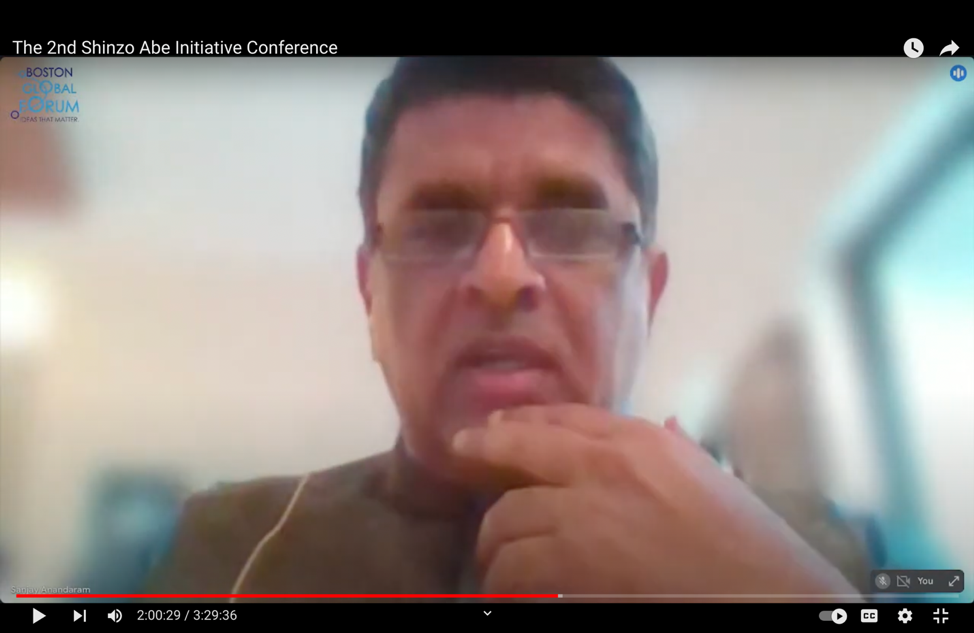Thank you, the Boston Global Forum, for the kind invitation to us at iSpirt to participate in the Shinzo Abe Initiative, 2nd Conference – Make the Economy of Japan Great in the Age of Global Enlightenment. I am Sanjay Anandaram, Ambassador of iSpirt, a not for profit technology think-and-do tank, based in Bengaluru, India. It is my pleasure to be in such distinguished company. Before I begin, I’d like to offer my Shraddhanjali ie homage and respects to Prime Minister Shinzo Abe who championed a deeper Japan – India friendship right from 2006 when he met with the then Indian PM Manmohan Singh in Tokyo. The bilateral relationship established then got upgraded to a “special and strategic partnership” in 2014 when PM Shinzo Abe and PM Modi effectively to encompass the diplomatic, military, and economic sectors. Japan was the first country with which India initiated a 2+2 dialogue between foreign and defense ministers. The two countries also conducted joint military drills, naval exercises, and counterterrorism operations. A Comprehensive Economic Partnership Agreement expanded their bilateral trade, with Japan becoming India’s 12th largest trading partner, and fourth largest investor by 2020. Importantly, in 2016, Japan and India signed a civil nuclear pact, eliminating Japan’s resistance to India as a nuclear power. PM Abe became the first Japanese prime minister to visit India three times. In a seminal speech in the Indian Parliament he shared a vision of the Indo-Pacific as a connected strategic domain, that there was “a Confluence of the Two Seas” and the “Pacific and Indian Oceans [were] a dynamic coupling as seas of freedom and prosperity.” This characterization enabled Japan’s bilateral relationship with India to grow into the larger cooperative partnership, the Quadrilateral Security Dialogue that was catalyzed by the rise of China. According to a Japan Bank of International Cooperation survey, India tops as an investment destination for Japanese companies. Today, as geopolitics, technology and energy reconfigure global supply chains, priorities and partnerships, it is important to see how India and Japan can build upon and strengthen their ties through technology. Here are some key areas:
1) India is a leader in conceptualizing, designing, developing and deploying digital public goods at continent scale. Recognised by the UN, World Bank and now an agenda item at the G20, these cover health, education, credit, payments, drones, ecommerce, agriculture among other areas; these are critical to the societal transformation of their own countries and to others around the world in a low cost, high volume, speedy, consent based manner. MOSIP, The world’s largest DPG is from India, is being deployed in Africa and Asia. American, European and Indian entities are part of this. Japan can play a major role here.
2) PM Abe coined the phrase “Data Free Flow with Trust” at the 2019 G20 Meeting in Osaka (India did not participate in the Declaration on Digital Economy). There is ample opportunity now for India and Japan to work together on building upon India’s pioneering techno-legal formulation on not just data privacy but also data empowerment & protection. This will go a long way in ensuring Data Free Flow with Trust. This will require India and Japan and others to work together to create new institutions, standards, innovation in policy, governance, regulations and access to markets.
3) There can be no discussion without AI – the flavour of the season! While there has been a call by leading AI Lab heads and experts to halt work on AI till discussions are held on issues of concern, it is important to also note that for the developing world, AI can play an enormous multiplier role in areas like healthcare, education, agriculture, security. In addition, various Indian (AI for 22 Indian languages bhashini initiative in India) and Japanese language translations via AI – this then can be of great value to the sharing of knowledge, practices and experiences. Japan’s expertise in AI & security coupled with India’s initiatives and capabilities (a 2020 report estimated that 12% of AI researchers worldwide are from India) can offer AI for good; In addition, areas like 6G, decarbonization technologies, security and quantum computing offer opportunities for partnerships.
4) India is one of the world’s top startup hubs as well as home to a large number of scientists and engineers. Japanese companies, capital, hardware & system technology and India with its market, software & science talent can work together for joint development and deployment of new solutions for the world.
5) Finally, the Japanese ikigai or ultimate purpose of our being, in the Age of Global Enlightenment with peace and humaneness, is tied into the realisation of Vasudhaiva Kutumbukam. The World is One Family, an ancient Indian moral value engraved at the entrance to the Parliament of India. Thank You!
